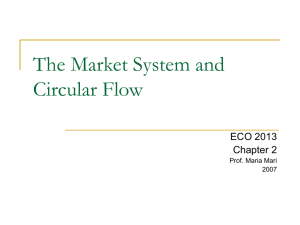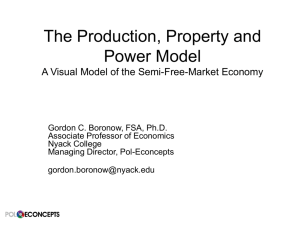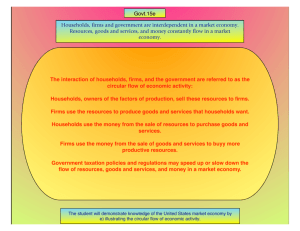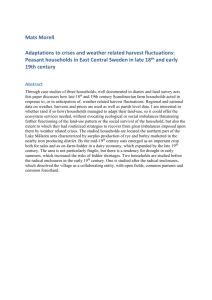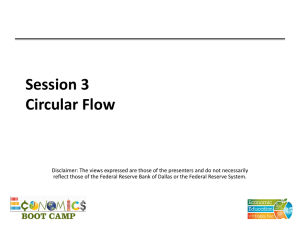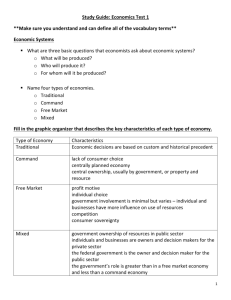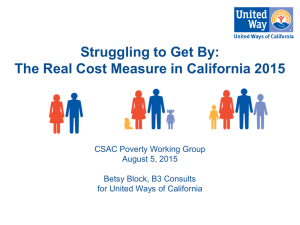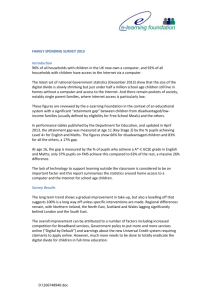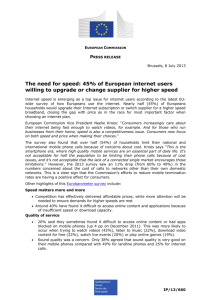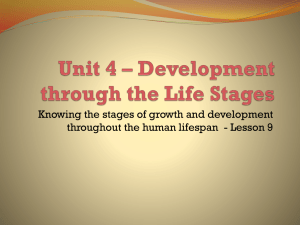Free Enterprise – Free Market
advertisement
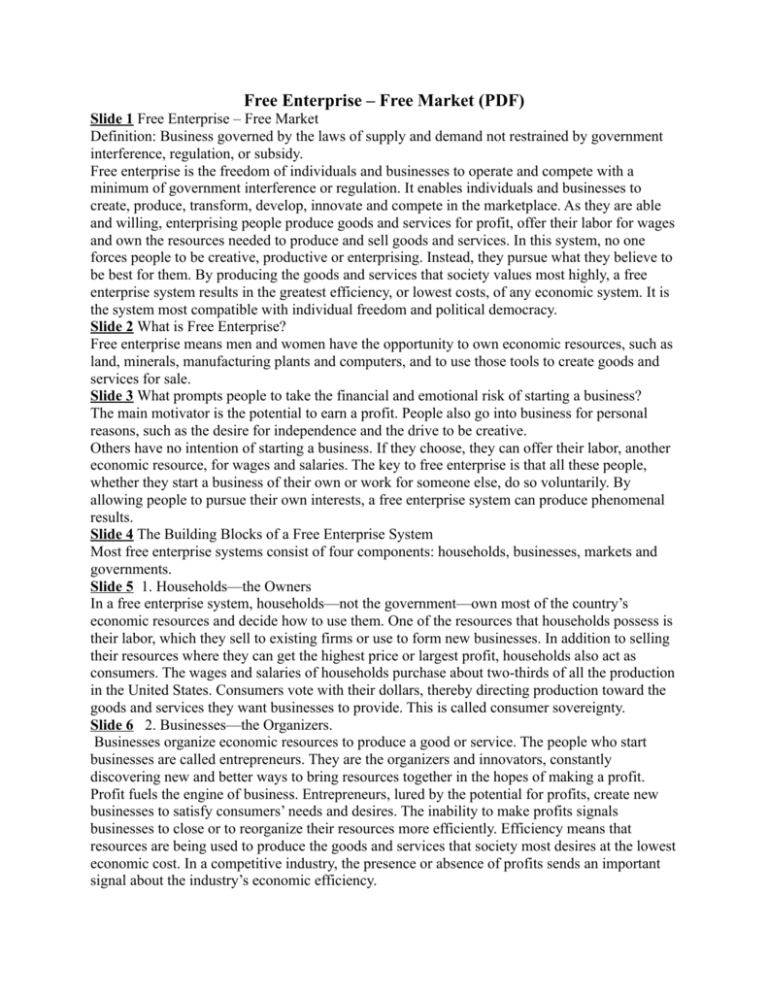
Free Enterprise – Free Market (PDF) Slide 1 Free Enterprise – Free Market Definition: Business governed by the laws of supply and demand not restrained by government interference, regulation, or subsidy. Free enterprise is the freedom of individuals and businesses to operate and compete with a minimum of government interference or regulation. It enables individuals and businesses to create, produce, transform, develop, innovate and compete in the marketplace. As they are able and willing, enterprising people produce goods and services for profit, offer their labor for wages and own the resources needed to produce and sell goods and services. In this system, no one forces people to be creative, productive or enterprising. Instead, they pursue what they believe to be best for them. By producing the goods and services that society values most highly, a free enterprise system results in the greatest efficiency, or lowest costs, of any economic system. It is the system most compatible with individual freedom and political democracy. Slide 2 What is Free Enterprise? Free enterprise means men and women have the opportunity to own economic resources, such as land, minerals, manufacturing plants and computers, and to use those tools to create goods and services for sale. Slide 3 What prompts people to take the financial and emotional risk of starting a business? The main motivator is the potential to earn a profit. People also go into business for personal reasons, such as the desire for independence and the drive to be creative. Others have no intention of starting a business. If they choose, they can offer their labor, another economic resource, for wages and salaries. The key to free enterprise is that all these people, whether they start a business of their own or work for someone else, do so voluntarily. By allowing people to pursue their own interests, a free enterprise system can produce phenomenal results. Slide 4 The Building Blocks of a Free Enterprise System Most free enterprise systems consist of four components: households, businesses, markets and governments. Slide 5 1. Households—the Owners In a free enterprise system, households—not the government—own most of the country’s economic resources and decide how to use them. One of the resources that households possess is their labor, which they sell to existing firms or use to form new businesses. In addition to selling their resources where they can get the highest price or largest profit, households also act as consumers. The wages and salaries of households purchase about two-thirds of all the production in the United States. Consumers vote with their dollars, thereby directing production toward the goods and services they want businesses to provide. This is called consumer sovereignty. Slide 6 2. Businesses—the Organizers. Businesses organize economic resources to produce a good or service. The people who start businesses are called entrepreneurs. They are the organizers and innovators, constantly discovering new and better ways to bring resources together in the hopes of making a profit. Profit fuels the engine of business. Entrepreneurs, lured by the potential for profits, create new businesses to satisfy consumers’ needs and desires. The inability to make profits signals businesses to close or to reorganize their resources more efficiently. Efficiency means that resources are being used to produce the goods and services that society most desires at the lowest economic cost. In a competitive industry, the presence or absence of profits sends an important signal about the industry’s economic efficiency. Slide 7 3. Markets—the Brokers. How and where do buying and selling activities take place? The answer is, in markets. Although markets are not necessarily people, they act as agents—something like a stockbroker or a real estate agent—to bring buyers and sellers together. Over time, markets have become increasingly complex. Now, buying and selling can occur 24 hours a day from anywhere in the world via the Internet. A market is any place or any way that buyers and sellers can exchange goods, services, resources or money. There are three categories of markets in a free enterprise society: resource markets, product markets and financial markets. Households go through resource markets to sell their labor to businesses. Businesses go through product markets to sell goods and services to households. And both households and businesses use financial markets to borrow and save money. Typically, businesses borrow money that households save, using financial institutions as the intermediary. Slide 8 4. Governments—the Protectors. The cornerstone of a truly free enterprise economy is the absence of government interference in economic matters. However, the government still plays an important role in any free enterprise system. The main role of government in a free society, then, is to define and enforce the rules of society. Government has the coercive power to maintain law and order, protect people’s right to own property and enforce voluntary contracts people enter into. In essence, government provides the umbrella under which the free enterprise system operates. Governments also provide goods, such as national defense, that the private market alone would have a hard time producing. Slide 9 The Price System The price system is the link that connects consumers, producers and markets. Prices tell us about the demand for a good, and they also tell us how scarce or abundant the good is. Prices provide information that is vital to making economic decisions. Without market prices, it would be very difficult for people to measure the value to society of each good and the scarcity or abundance of our resources. If we tried to make decisions without prices, as socialist countries do, then we would probably produce too many of some goods and too few of others. Slide 10 The "Free" of Free Enterprise Free markets are an extension of personal freedom. The premise of a market system is that people benefit from their own purposeful actions. As a corrosion consultant to the chemical industry, I make recommendations to owners and engineers on materials of construction for process equipment; such as, pipes, vessels, scrubbers, stacks, hoods, towers, covers or linings. Depending on the service, I would either recommend a metallic or plastic composite to handle the environment. My clients pay me for my services and they in turn get an efficient, long lasting system which improves productivity and plant safety, lowers maintenance expense and adds profit. My job is to help my clients be competitive in the marketplace and help add value to their products. Both parties benefit. Slide 11 The "Enterprise" of Free Enterprise In a free enterprise system, entrepreneurs, or risk-takers, have a strong incentive to pay attention to the votes consumers register with their dollars. This is because entrepreneurs profit by meeting consumers’ wants and needs. Entrepreneurs continually strive to improve established products and discover new ones. In the end, both the producers and the consumers benefit. Producers can earn a profit, and consumers can obtain the goods and services they want. Slide 12 Four Freedoms in A Free Economy 1. FREEDOM TO TRY One of the most essential ingredients in a healthy economy is the freedom to try. This is really the freedom to achieve and it is based on the principle that "the genius of one or a few men cannot begin to compare in the aggregate to the genius of all the people." 2. FREEDOM TO SELL" is really the opportunity to survive. This means that a competitor must exert his faculties to produce more efficiently and reduce his price, or improve the quality of his product, so that the public will pay the difference to get it. 3. FREEDOM TO BUY If the inventor of some new product is to enjoy the freedom to sell, then the public must certainly enjoy the freedom to buy. 4. FREEDOM TO FAIL Last of all, we come to the freedom which harbors in its bosom the golden secret of all successful free enterprise economies. This is the freedom to fail. Under free enterprise market every businessman who wishes to survive must do a lot of long term research as well as make a continuous study of his current operation. Services must be continually improved, waste must be eliminated, efficiency in operations must be constantly pushed. And all of this is simply to keep the individual or company from failing. Occasionally we find a businessman, whose neck may be new to the yoke, refusing to extend himself in order to meet the competition of others who are more alert, more aggressive, more anxious to serve and more accommodating.

